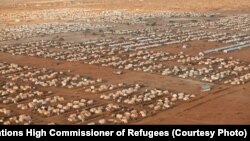The majority of the world’s refugees live in Africa, and there is a “need for a new deal” when it comes to their interests, International Rescue Committee President David Miliband said Thursday.
"The debate should not be yes or no to camps,” Miliband said, following visits to two large refugee camps slated for closure in Kenya. “The issue is finding something better than camps for the long-term displaced.”
The Kenyan government said this week that it would go ahead with plans to close the Dadaab and Kakuma camps “within the shortest time possible.”
Kenya hosts more than a half-million refugees, with about three-fourths from Somalia, and most of the others from South Sudan. Conflict continues in both countries.
Opened in 1991
The Dadaab refugee camp was opened in 1991. About 100,000 of Dadaab's current residents were born there and do not know any other place, Miliband said.
“There is a danger that people only think about the European refugee crisis,” he said, adding that Kenya has shown "enormous resilience and fortitude" in hosting refugees for the past 25 years. He also noted that conflicts in the Middle East have further squeezed international aid budgets.
Kenya’s interior ministry said al-Shabab terrorists have used the Dadaab camp, home to an estimated 328,000 Somali refugees, to plan and train for attacks, like the one at Nairobi’s Westgate Mall, where 67 people were killed in September 2013.
Somalia’s foreign ministry disputes that claim and said closing the camps would amplify security threats in the region.
'Taking advantage'
“If you bring children and young people to Jubba Valley [southern Somalia], the extremists could be taking advantage of them, either harming them or recruiting them,” Foreign Minister Abdisalam Hadliye Omar told VOA’s Somali service Thursday.
Kenya has threatened to close the refugee camps in the past, most recently in 2015 and 2013, but has never followed through.
The United Nations has expressed "profound concern” about the government’s plans. In a statement this week, the U.N. said the safety of hundreds of thousands of refugees hinges on Kenya's generosity.
Kenya's government said the international community must take steps to minimize the refugees’ pain and suffering, acknowledging that the closures will cause them harm.





